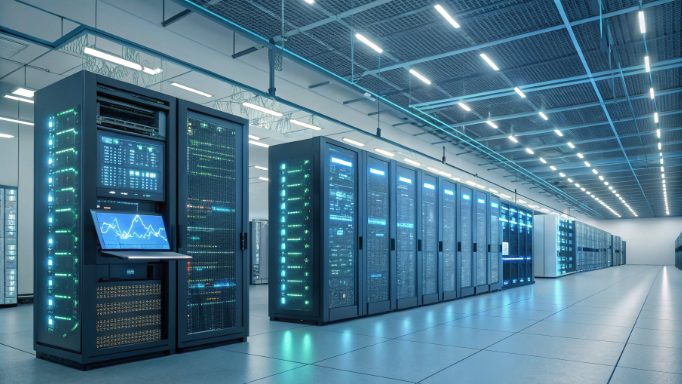Core Server Requirements for AI Industry Big Data Processing

The exponential growth in artificial intelligence and big data processing has revolutionized server infrastructure requirements. As AI workloads become increasingly complex, understanding the core server hosting requirements for AI industry big data processing has become crucial for tech professionals and organizations. With the emergence of large language models (LLMs) and sophisticated computer vision applications, the demands on computing infrastructure have reached unprecedented levels.
Computational Power Requirements: Beyond Traditional Servers
Modern AI workloads demand unprecedented computational capabilities, particularly in deep learning and neural network training. High-performance computing (HPC) clusters specifically designed for AI operations require:
- Multi-GPU configurations with latest NVIDIA A100 or H100 architectures, supporting up to 80GB HBM3 memory per GPU
- High core-count CPUs with advanced vector processing capabilities, supporting AVX-512 and VNNI instructions
- Dedicated AI accelerators for specific workloads, including TPUs and FPGAs for specialized applications
- NVLink or similar high-speed GPU interconnect technology, delivering up to 900 GB/s bidirectional bandwidth
- Specialized tensor processing units for machine learning model inference
- Hardware-level support for mixed-precision training operations
Storage System Architecture for AI Workloads
AI data processing requires a sophisticated storage infrastructure that can handle massive datasets while maintaining optimal performance. Modern systems must support both high-throughput training operations and low-latency inference:
- NVMe SSDs with read/write speeds exceeding 7GB/s, featuring PCIe Gen 4.0 interface
- Parallel file systems for distributed computing, such as Lustre or BeeGFS
- Tiered storage architecture combining hot and cold storage, with automated data migration
- Data redundancy and backup systems with minimal latency, including RAID 6 or erasure coding
- Cache coherency protocols optimized for AI workloads
- Distributed object storage systems for scalable data management
- In-memory storage solutions for frequently accessed datasets
Network Infrastructure Requirements
High-speed networking is crucial for AI workload distribution and data transfer efficiency. Modern AI infrastructure demands network solutions that can handle massive parallel operations:
- InfiniBand HDR/NDR or high-speed Ethernet (100GbE minimum) with full bisectional bandwidth
- Ultra-low latency network fabric with sub-microsecond latency
- RDMA capabilities for faster data movement, supporting both RoCE and iWARP
- Advanced network security protocols, including MACsec encryption
- Software-defined networking (SDN) for dynamic traffic optimization
- Quality of Service (QoS) mechanisms for workload prioritization
- Network disaggregation support for flexible resource allocation
Cooling and Power Infrastructure
AI workloads generate significant heat and require substantial power, necessitating advanced infrastructure. Modern facilities must implement sophisticated cooling solutions:
- Liquid cooling systems for high-density GPU racks, including direct-to-chip solutions
- Redundant power supplies rated at 2000W or higher with 80 Plus Titanium efficiency
- Advanced power distribution units (PDUs) with real-time monitoring capabilities
- Environmental monitoring systems with predictive maintenance features
- Immersion cooling solutions for extreme density deployments
- Dynamic power capping and thermal management systems
- Green energy integration capabilities for sustainable operations
Advanced Data Center Solutions in the US Market
Leading US data centers offer specialized environments optimized for AI workloads, providing distinct advantages in the competitive landscape:
- Strategic locations with optimal power grid access and renewable energy sources
- 24/7 technical support with AI infrastructure expertise and specialized training
- Compliance with data security regulations, including HIPAA and GDPR
- Scalable infrastructure for growing computational needs with modular design
- Edge computing capabilities for distributed AI processing
- Multi-region availability for disaster recovery
- Advanced physical security measures with biometric access control
Configuration Recommendations for AI Workloads
When selecting server configurations for AI processing, consider these technical specifications that balance performance and efficiency:
- Minimum 8x NVIDIA A100/H100 GPUs per server with NVLink 4.0 interconnect
- Dual AMD EPYC or Intel Xeon processors with 64+ cores each, supporting PCIe Gen 5
- 1TB+ DDR5 ECC memory with speeds exceeding 4800MT/s
- Multiple 100GbE network interfaces with hardware offload capabilities
- Redundant power supplies with N+1 configuration and intelligent load balancing
- PCIe Gen 5 fabrics for enhanced device connectivity
- Specialized FPGA accelerators for specific AI tasks
Performance Optimization Strategies
Maximize AI workload efficiency through these technical optimizations that leverage modern hardware capabilities:
- CUDA core utilization monitoring and tuning with advanced profiling tools
- Memory bandwidth optimization techniques, including cache-aware algorithms
- Network topology optimization with adaptive routing
- I/O scheduling improvements using NVMe multipathing
- Workload-specific compiler optimizations
- Dynamic voltage and frequency scaling for energy efficiency
- Container orchestration for optimal resource utilization
Future-Proofing Your AI Infrastructure
Consider these emerging technologies when planning infrastructure upgrades to maintain competitive advantage:
- Quantum computing integration capabilities with hybrid classical-quantum systems
- Next-generation AI accelerators supporting neuromorphic computing
- Photonic computing interfaces for ultra-high-speed data transfer
- Advanced cooling technologies including two-phase immersion systems
- Silicon photonics for inter-chip communication
- Chiplet-based architectures for flexible scaling
- Carbon-neutral data center technologies
As the AI industry continues to evolve, server requirements for big data processing become increasingly sophisticated. Organizations must carefully evaluate their AI workload requirements and select appropriate server configurations while considering factors such as GPU computing power, storage architecture, and networking capabilities. The US hosting market offers cutting-edge solutions that meet these demanding requirements while providing scalability for future growth. Success in AI deployment depends not only on selecting the right hardware but also on implementing efficient software stacks and maintaining optimal operational practices.

